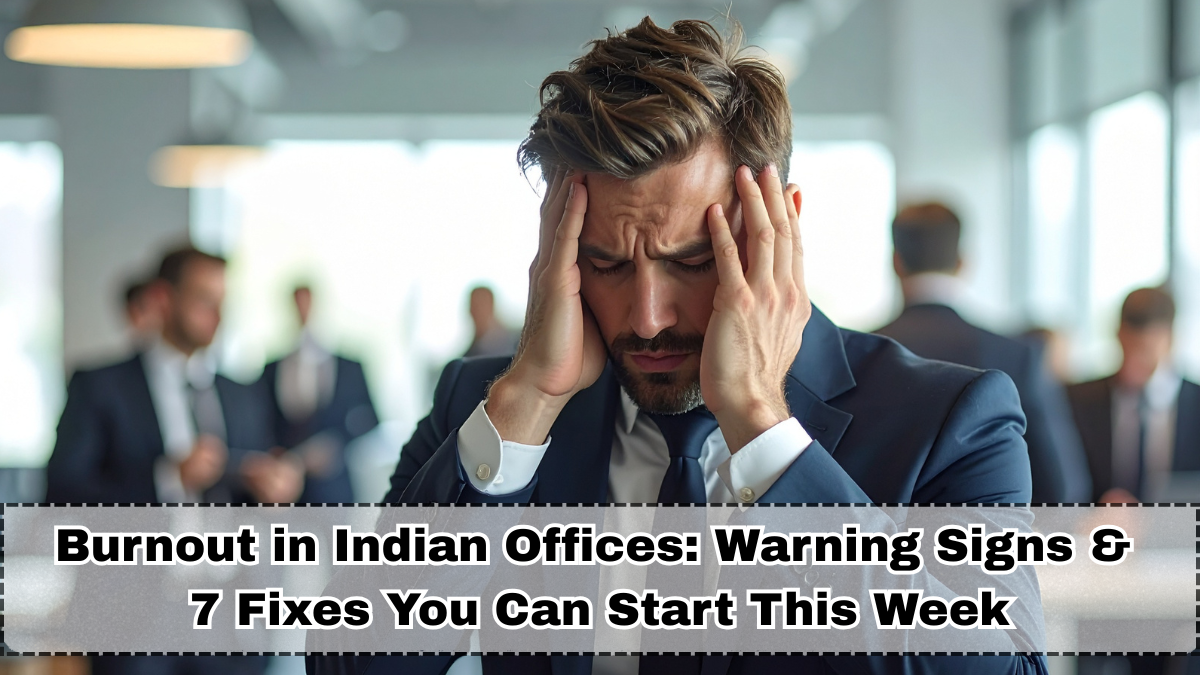Work pressure in India has reached new heights in 2025. From long office hours to weekend calls, demanding bosses, unstable job markets and constant notifications, employees across metro cities are silently battling exhaustion. The rise of work stress and burnout India is now one of the biggest mental health concerns, affecting productivity, relationships and overall well-being.
Burnout is not just “being tired.” It is a state of physical, emotional and mental overload that builds slowly and hits hard. This article helps you identify the warning signs of burnout and offers simple, actionable fixes Indian professionals can start using immediately.

Why Burnout Is Increasing in India in 2025
India’s corporate environment has become more intense with tight deadlines, hybrid work pressure and fear of layoffs. Many employees feel they have no real break — even after office hours.
Factors behind rising burnout
• Always-on work culture
• Constant Slack/WhatsApp messages
• Unrealistic performance targets
• Job insecurity
• Long commutes in big cities
• Lack of work-life boundaries
• Social pressure to “achieve more”
Together, these create a cycle of stress that eventually leads to burnout.
Key Warning Signs of Burnout Indian Professionals Often Ignore
Burnout builds slowly. Many Indians assume the symptoms are normal — but ignoring them can worsen both mental and physical health.
Common signs
• Constant tiredness even after sleeping
• Irritability and mood swings
• Headaches, neck pain or eye strain
• Feeling detached from work
• Trouble focusing
• Low motivation even for simple tasks
• Feeling overwhelmed easily
• Losing interest in hobbies
If you relate to 3 or more of these, you may be entering burnout territory.
Physical Symptoms That Often Show Up First
Indians often look at burnout as “mental,” but it affects the body too.
You may notice
• Rapid heartbeat
• Shoulder stiffness
• Digestive issues
• Sleep disturbances
• Hair fall due to stress
• Frequent colds and low immunity
Your body sends signals before your mind fully understands what’s happening.
Emotional Signs You Should Never Ignore
Burnout impacts the way you feel about yourself and your work.
Common emotional red flags
• Feeling stuck in life
• Frustration and anger
• Withdrawal from friends and family
• Feeling empty or numb
• Thinking “I can’t do this anymore”
These signs indicate your mind needs rest and support.
7 Fixes You Can Start This Week to Reduce Burnout
Burnout cannot be fixed in one day, but small steps create big results. These solutions fit Indian work-life patterns and can be implemented immediately.
1. Set “Hard Stop” Timings After Work
Decide a time after which you will not respond to calls or messages unless absolutely necessary.
Benefits
• Reduces evening stress
• Gives your mind a shutdown time
• Helps rebuild personal life boundaries
This is crucial for hybrid and remote workers.
2. Reduce Noise by Limiting Notifications
Constant notifications are a top reason for mental fatigue.
Practical steps
• Turn off work notifications after office hours
• Mute non-essential groups
• Use “Do Not Disturb” mode during deep work
• Check emails in batches instead of constantly
Your mind needs focus, not constant alerts.
3. Start a 10-Minute Morning Ritual
A short morning routine helps rebalance your mind before the day begins.
You can try
• Stretching
• Prayer or meditation
• Light music
• Journaling
• A short walk in sunlight
This creates a calmer mindset for the entire day.
4. Plan Two 15-Minute Breaks During Work
Many Indians believe breaks reduce productivity, but the opposite is true.
Benefits
• Reduces eye strain
• Improves focus
• Lowers stress load
• Refreshes creativity
Even standing up and walking around for a minute helps.
5. Use Movement to Reset Your Energy
Long sitting hours make stress worse. Small movements regenerate mental clarity.
Simple options
• A 5-minute walk
• Shoulder rolls
• Desk yoga
• Light stretching
Movement signals your body to release built-up tension.
6. Talk Openly About Workload and Expectations
In Indian workplaces, employees often avoid speaking up — but communication prevents burnout.
You can discuss
• Overlapping deadlines
• Unclear expectations
• Need for more support
• Upcoming personal commitments
Most managers respond better than expected when you communicate clearly.
7. Build a Life Outside Work
Burnout gets worse when work becomes the only identity.
Rebuild your personal world
• Restart a hobby
• Spend time with family
• Join a fitness class
• Meet friends weekly
• Watch or read something relaxing
Life should feel bigger than your workload.
When Should You Consider Professional Help?
If burnout begins affecting your health, relationships or daily functioning, it’s wise to seek support.
Seek help if you notice
• Persistent sadness
• Panic attacks
• Insomnia
• Loss of appetite
• Inability to work or concentrate
Therapists in India now offer online sessions, making it easier to access help discreetly.
Final Thoughts: Burnout Is Not Weakness — It’s a Warning
Burnout doesn’t mean you’re not strong enough — it means you’ve been strong for too long. Indian work culture demands resilience, but your mind and body need rest to function at their best.
By recognising the signs early and using the strategies above, you can protect your mental health, maintain productivity and rebuild balance. Work stress and burnout India is a serious issue in 2025, but with awareness and action, it is completely manageable.
FAQs
How common is burnout in India in 2025?
Very common, especially among tech, finance and remote workers.
Is burnout permanent?
No, with proper rest and lifestyle changes, most people recover fully.
Should you quit your job if you’re burnt out?
Not always. Try fixes first, then decide.
Do small breaks really help?
Yes, they reset your brain and reduce mental fatigue.
Can burnout affect physical health?
Yes, it can trigger headaches, sleep issues and lowered immunity.
Click here to know more.
